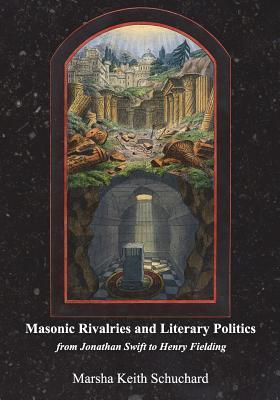Masonic Rivalries and Literary Politics: From Jonathan Swift to Henry Fielding

Masonic Rivalries and Literary Politics: From Jonathan Swift to Henry Fielding
Introduction
Chapter 1 - The Ruined Temple and the Flight of Knights (1685-1691)
Chapter 2 - Freemasons, Rosicrucians, and Radical Clubs (1691-1703)
Chapter 3 - Jacobites, Williamites, and Disputed Architectural Traditions (1695-1703)
Chapter 4 - Judaized Scots, Jacobite Jews, and the Problem of "False Brothers" (1702-1712)
Chapter 5 - Building Castles in the Air, at Home and Abroad (1710-1716)
Chapter 6 - The Swedish-Jacobite Plot and the Grand Lodge of London (1716-1719)
Chapter 7 - Scottish-Swedish Masonic Traditions and English Innovations (1719-1722)
Chapter 8 - Atterbury, Wharton, and "Combinations of Workmen" (1722-1723)
Chapter 9 - Chinese and Cabalistic Threats to the Grand Lodge (1723-1724)
Chapter 10 - Masonic Rivalries and International Ramifications (1725-1726)
Chapter 11 - A New King, Yet Old Corruption (1727-1730)
Chapter 12 - International Expansion of Chivalric Masonry (1730-1732)
Chapter 13 - Masonic Politics and "A Babel of Religions" (1732-1733)
Chapter 14 - Outbreaks of "Hyp" at Home and Abroad (1734)
C
PRP: 232.50 Lei
Acesta este Pretul Recomandat de Producator. Pretul de vanzare al produsului este afisat mai jos.
209.25Lei
209.25Lei
232.50 LeiLivrare in 2-4 saptamani
Descrierea produsului
Introduction
Chapter 1 - The Ruined Temple and the Flight of Knights (1685-1691)
Chapter 2 - Freemasons, Rosicrucians, and Radical Clubs (1691-1703)
Chapter 3 - Jacobites, Williamites, and Disputed Architectural Traditions (1695-1703)
Chapter 4 - Judaized Scots, Jacobite Jews, and the Problem of "False Brothers" (1702-1712)
Chapter 5 - Building Castles in the Air, at Home and Abroad (1710-1716)
Chapter 6 - The Swedish-Jacobite Plot and the Grand Lodge of London (1716-1719)
Chapter 7 - Scottish-Swedish Masonic Traditions and English Innovations (1719-1722)
Chapter 8 - Atterbury, Wharton, and "Combinations of Workmen" (1722-1723)
Chapter 9 - Chinese and Cabalistic Threats to the Grand Lodge (1723-1724)
Chapter 10 - Masonic Rivalries and International Ramifications (1725-1726)
Chapter 11 - A New King, Yet Old Corruption (1727-1730)
Chapter 12 - International Expansion of Chivalric Masonry (1730-1732)
Chapter 13 - Masonic Politics and "A Babel of Religions" (1732-1733)
Chapter 14 - Outbreaks of "Hyp" at Home and Abroad (1734)
C
Detaliile produsului








